Greening the Desert Multiplying farm incomes, reversing migration, Rotary blazes a trail in Rajasthan.
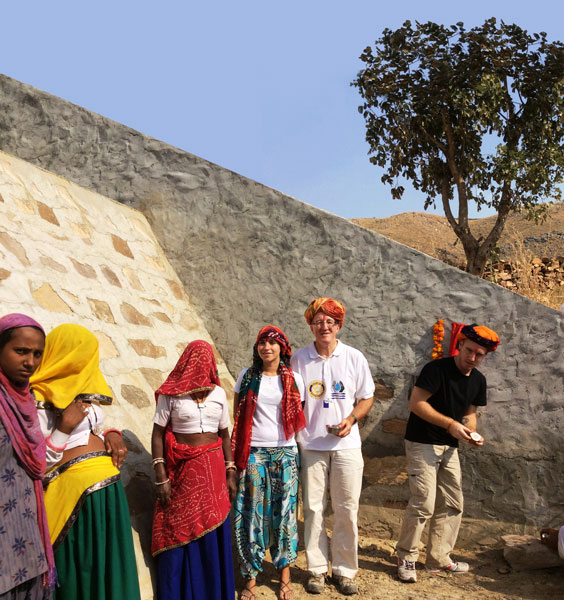
When an old woman from a remote, interior village in Rajasthan’s Sikar district comes forth with a confident toothless grin and whispers in the ear of a Rotarian that “this year I made Rs 1 lakh by selling fish which a contractor had quietly put in this dam for me,” you have to take note.
This feat was achieved in the Kemra Wala dam, built in a semi-desert area in Sikar by the Rotary India Water Conservation Trust (RIWCT) in partnership with the PHD Rural Development Foundation. Not only have the incomes of over six lakh villagers – in agri families – in Rajasthan’s Sikar and Alwar districts multiplied several times thanks to dependable water supply allowing three, instead of the earlier one crop, this impressive project has also reversed migration from these semi-arid villages into cities for menial jobs.
Water banks
Unlike a dam built across an existing river/rivulet, a check dam is built to check the flowing away of rainwater from any catchment area. The idea is not to create a new water source for irrigation or drinking but to harness and harvest water which percolates into the ground and recharges surrounding areas, including wells.
55 check dams have been completed, changing the lives of 6 lakh rural people.
In this classic rainwater harvesting, the catchment areas in the 55 check dams the RIWCT have built so far varies from 3-7 km in length. And the check dam wall is around 14 ft high, with a foundation of 7 ft to prevent its erosion. “Over the years, we’ve learnt to choose ideal catchment areas and where the check dam can be built,” says Atul Dev, RIWCT Secretary, project coordinator and past president of RC Indraprastha-Okhla. The terrain and area where the Kemra Wala dam shimmers with water was ideal enough for Rotary to construct a string of eight check dams in a row, benefitting farmers in 20 surrounding villages.
The result is an unbelievable transformation in this semi-desert region with scanty annual rainfall. The water from the Aravalli hills flows and stays in the check dam catchments for 6-8 months, with 15 of the 55 dams (including in Dausa and Mewat, Haryana) becoming perennial, just like the Kemra Wala now breeding fish! And when the water recedes, the silt and rich minerals left behind provide additional scope for a quick cash crop before the onset of the next monsoon!
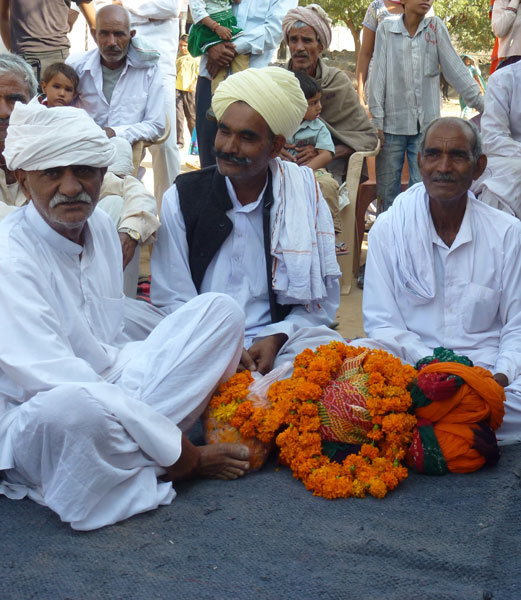
Pointing to the greenery in the area, despite this year’s disappointing rainfall, Goverdhan, a village elder and backbone of this Rotary venture, says, “Due to water scarcity, these farmers could earlier grow only millets and a little wheat. Now, they have three crops — millets, wheat and vegetables such as bhindi (okra), tomatoes, and green chillies. Last year some farmers sold bhindi worth Rs one lakh and “ek ek kisan ne Kemra Wala ke pani se sawa lakh ki mirchi bechi.” (Many farmers sold chilly worth Rs 1.25 lakh each). Earlier their wells didn’t have water even at 18 ft, against 10 ft now.
A French saviour
Small wonder then that there is a mela-like atmosphere in the Kalakota village I visit with Dev and Past President of RC Brumath Truchtersheim Kochersberg, Philippe Dangelser, scheduled to inaugurate three completed check dams and do groundbreaking for three more in Sikar and Alwar districts.
Rtn Philippe Dangelser has helped build 20 check dams.
Like a seasoned veteran Dangelser receives the traditional welcome with marigold garlands, red tilak, and Rajasthani turban. He has returned with a fund of 30,000 euros to build 4-5 more check dams; each dam costs around Rs 8 lakh. He comes twice a year to India with money raised from France and Germany for check dams; his latest tally – 20!
His India connection began in 2005 when at the Chicago Rotary Convention, PDG Ranjan Dhingra, also a District Water Chair, invited him to visit India. He did, and has never looked back. He talks with India with enough love and insight to merit a farmer’s comment: “Another god gave us birth, you gave us life.” He finds “India different and very special because I look at India with fresh eyes.”
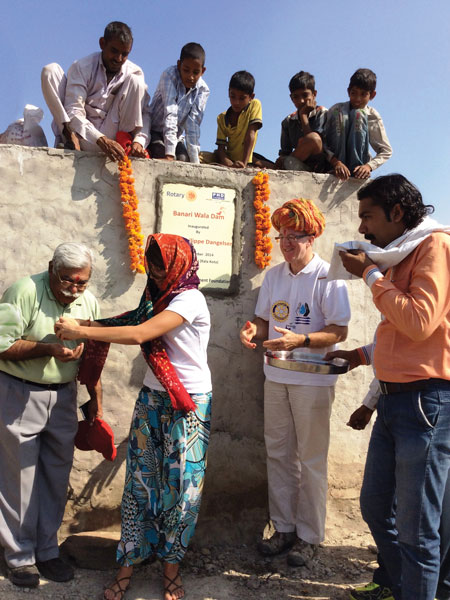
As we drive towards the Banariwala Dam in Kalakota that Dangelser will inaugurate, the solid work done by the Magsasay Award winner Rajendra Singh in water conservation comes to mind. Goverdhan worked with him for 16 years, before joining this project. Today he is a leading patriarch, but 10 years ago, in the interior village Guwaravyas in Alwar District, 65 km from Jaipur, where he hosted Dangelser in his house for a couple of nights, “the villagers wanted to throw me out when I talked of building check dams. They wanted to put a rape charge on me hoping I’d run away,” chuckles the wise man.
Reversing migration
Of the Rs 5 crore spent on these dams, Rs 1.25 crore came from the Latter-Day Saint Charities for 21 dams.
The farmers at Goverdhan’s spacious house are only too willing to share their happy stories. Some have built three homes. Malliram, 60, is one. In 10 years, his five sons migrated to cities to do menial jobs. “They’ve all come back as now “there is khoob pani, khoob anaj, khoob paisa (lots of water, lots of foodgrains and lots of money),” he says. Last year he bought a tractor worth Rs 5 lakh.
I have two M.As; sochta hu ki Ph.D. kar lu.
— Banwari, an empowered young farmer.
The most tangible benefits of reaching water to this parched land is not only arresting but reversing migration from villages to cities. “Our villages no longer have only old men and women. Our young men have returned,” adds Goverdhan.
And the transformation brought about by this water project, spearheaded by TRF Trustee Sushil Gupta (see box), where Rotarians from US, Canada, France and Russia have donated physical labour too, in the mindspace of villagers like Dinesh and Banwari is amazing. Dinesh can reel off details about different dams from the top of his head.
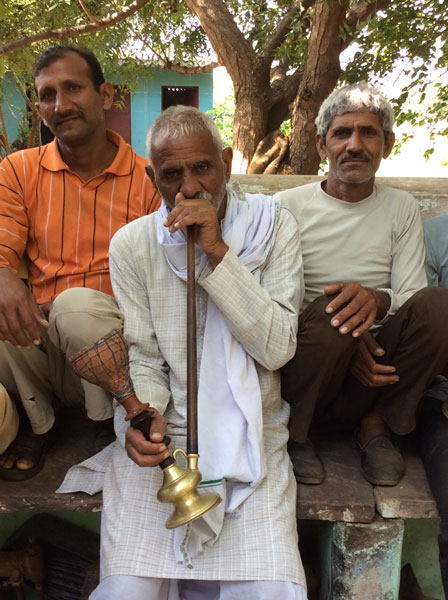
The check dams chosen for Dangelser are located in remote and inaccessible villages. The terrain our Innovas cannot negotiate are tackled by two old, rattling Mahindra jeeps. Amazingly, Dangelser asks and gets music in the rickety jeep where a USB is fixed on a music contraption! Long treks, sometimes over 1 km are involved and Dinesh deftly doubles up as my cameraman in frames I’m required, and handles my iPad Air with elan.
By late evening when I’m ready to drop dead and opt out of trekking to the last dam which has turned perennial, he coaxes me to jump on to his mobike. “You can’t miss Kemra, it is the best.” The young Frenchwoman, Anne, joins too and the triple riders on Dinesh’s mobike get peels of laughter from the local women in ghunghats!
The only jarring note is the way the men address their women. Hopefully Rotary leaders such as Gupta will take up gender equity as the next challenge! But if Banwari’s lead is anything to go by… he has stopped with one son, who is 5, and wants to send him to University, things are already changing.
He describes how the thorny kikar trees on the most barren land can fetch income for their wood, the increasing area under tobacco crop as “it has become fashionable for college girls and boys to smoke sheesha/hukkah in big hotels and how “bekar ki cheez mei hamesha jyada paisa hota hei (useless things get more money).” He next waxes eloquent on how the sale of sharab is propping up the Indian economy, and the economics of applying for sharab ke thekey (liquor shops).
As he gives more gyan on the medical properties of aloe vera growing wildly here, how it can cure joint pain, is used in Baba Ramdev’s ointments, I quiz him on his education.
“Oh, I am a double M.A in History and Political Science from the Rajasthan University, and after working with the Rotary check dams, I’ve got a diploma in water conservation,” he replies casually.
His parting shot: “Ab sochh raha hoon ki IGNOU se social work mei Ph D kar lu. (Now I’m thinking of doing a Ph.D from IGNOU)!”
Pictures by Rasheeda Bhagat
The water Messiah
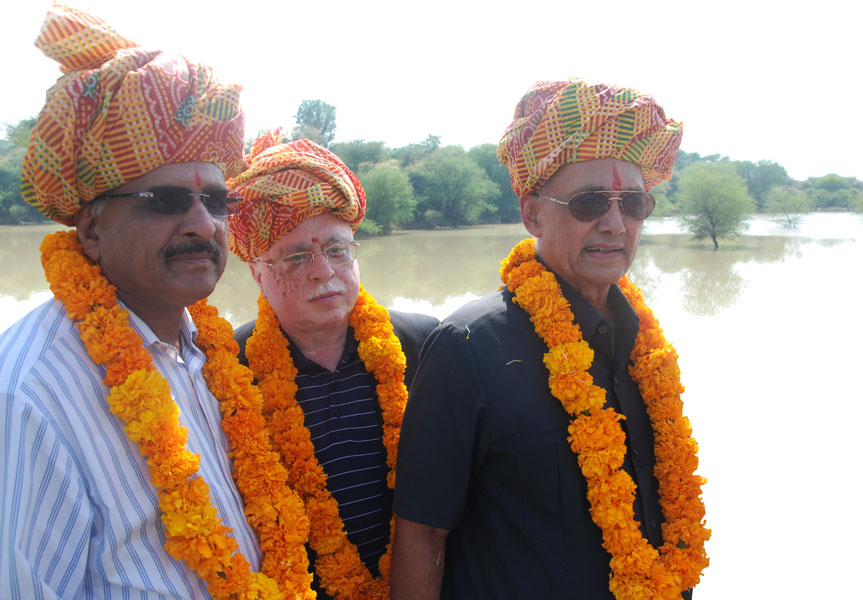
To succeed, every great project of this dimension needs passion, vision and relentless work… a messiah! The check dams project got one in the shape of TRF Trustee and PRID Sushil Gupta.
A vice chairman of the Himalayan Environmental Trust and chairman of the Gangotri Conservation Project, he has spent two decades in water.
“I have deeply studied water scarcity in India and other countries. Water activism is very dear to my heart,” says the former Chairman of the RIWCT, and present Chairman Emeritus.
So when in 2003 as RI Director he was asked for a possible theme and venue for a global conference, he suggested water and Delhi. President A P J
Abdul Kalam inaugurated it and the then Water Resources Minister Suresh Prabhu participated. A major highlight of the Delhi Declaration from this conference was creating water awareness and model Rotary water projects.
Thus was set up the RIWCT and Gupta’s passion gave the project global visibility by involving RI Presidents such as Kalyan Banerjee and D.K Lee to inaugurate projects named after them.
Barren land
Recalling the earlier days Goverdhan, a pillar of the project, says, “The land here was so dry that you could barely get drinking water at 800 ft depth. With monsoon water allowing cultivation of a couple of bighas (20 bighas make one acre) young men migrated to cities like Delhi and Mumbai to work as coolies, masons, etc.”
But today it is a different story. Goverdhan and his brothers are farming on 60 bighas and his nephew Banwari (33) is all smiles as he says how he sold his first crop of bhindi at Rs 58 a kg. “The last bit I sold at Rs 9 a kg, but I had made my money.”
I’m happy to put water on RI agenda.
— Sushil Gupta, TRF Trustee
As we are treated to a sumptuous lunch of makki ki roti with a dollop of butter, pooris, kadhi, methi and potato curry in Goverdhan’s house, the host amazes me with his humanity and generosity. “Man is a selfish and greedy creature anyway, but today, thanks to these check dams, we have copious water for animals and birds and plants and trees too, as you can see from the greenery around.”
PHD Foundation’s CEO Atul Rishi says these check dams and increased water availability have dramatically increased both the area under cultivation and incomes. Field Officer Mukti Narain Lal says some farmers’ incomes have jumped up 100–200 times because they had very meagre incomes. “From thatched homes they now have pucca houses, from camels and cattle they now have tractors to plough their fields.”
The best news is that now the villagers have taken ownership of these check dams and their maintenance for longer sustainability. Each dam has a committee with a corpus of Rs 50,000–1,00,000, kept in a bank for future maintenance. “The Kemra Wala dam committee has Rs 3.5 lakh and wants to increase the width of the dam wall which is now used as a bridge because a goat fell off its edge,” adds Atul Dev.
They’d like to increase the height too to store more water but this is not allowed under the project for fear of greater pressure causing a breach.
Adds Gupta with a satisfied smile, “I’m happy to have put water on RI’s agenda!”
